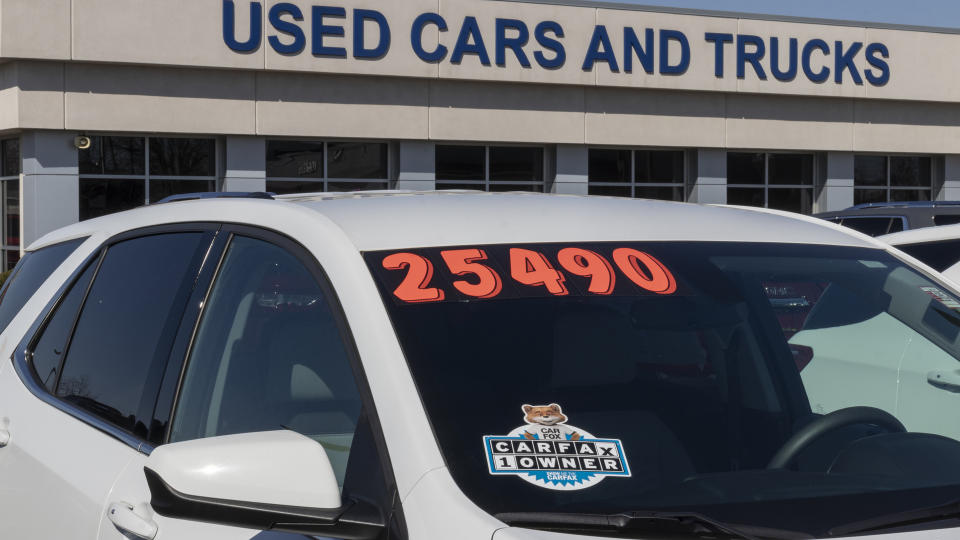6 Signs You Should Walk Away From a Used Car Deal

As falling used car prices give buyers a break, you might be planning to visit a local car dealer or browse used cars online. Before making a purchase, make sure you’re not falling for a scam, working with a dishonest seller or buying a used vehicle that could soon give you trouble.
Learn: 5 Used Cars You Should Stay Away From
Read: Pocket an Extra $400 a Month With This Simple Hack
If you notice any of these six signs, consider walking away from the used car deal.
1. You Can’t Get Enough Vehicle Information
Never agree to a used car deal unless you obtain all the information needed to assess the vehicle’s condition and reliability. This includes requesting service records as well as vehicle history reports, title details and accident information.
Ask the seller about past and current vehicle issues or recalls. Plus, inquire about any vehicle modifications and warranty information. Don’t proceed with the purchase if the seller avoids answering your questions.
2. You Can’t Check Out the Car Independently
An honest car dealer should let you check out the car by yourself. You should be able to inspect it thoroughly and obtain feedback from an independent inspector. The seller should also allow you to do a test drive to see how the vehicle performs and identify potential issues.
If the seller doesn’t offer these, it’s a clear sign to walk away. The vehicle could have damage or issues they don’t want you to know about.
3. You Feel Pressured Into Making the Purchase
To meet quotas and commissions, a salesperson might try to push you into a quick purchase decision or encourage you to buy unnecessary add-ons. These tactics may indicate that your money is more important than helping you find the right car.
Buying a car is a big decision. Take your time, ignore any pressure tactics and only buy once you’ve carefully considered every detail.
4. The Vehicle’s Condition Raises Red Flags
Beware of common red flags involving the used vehicle’s condition to avoid costly expenses later. For example, if the vehicle’s mileage is high, the car might have a shorter lifespan and require expensive repairs, making the purchase not worth it.
Take care to look the car over thoroughly. When you open the hood, check for any worn-out parts, odd smells or leaks. During a test drive, listen for noises and pay attention to how the vehicle handles. Also check for rust, cracks, dents or other damage to the car’s body and interior. If there’s lots of damage, you might want to consider a different vehicle.
5. The Deal Isn’t Transparent
When buying a car, you want everything to be as clear as possible. You want to know the financing options up front, including the interest rate and monthly payment amount, and the contract should have clear terms. Taxes and fees should also be disclosed, and the asking price should be realistic and reflect the age and condition of the car.
If the seller or dealership lacks transparency around any of those, or if the used vehicle cost increases suddenly, consider walking away and looking for a deal elsewhere.
6. The Seller Isn’t Trustworthy
Buying used cars from some sources may be risky, especially if they’re sellers with unknown or low ratings. Some examples include roadside sellers, individuals you don’t know and used car lots known for poor service or no warranties. Instead, focus on well-known and reputable franchises and independent car dealerships.
Always research the seller beforehand for reviews from past customers. Look for any repeat concerns including pushy salespeople, vehicle service issues and unclear pricing. You can check review sites like Google reviews, DealerRater, Yelp and Edmunds.
More From GOBankingRates
I'm a Financial Expert: Here's How You Can Save $10K or More in the Next Year
4 Reasons You Should Be Getting Your Paycheck Early, According to An Expert
10 Ways to Turn Your Six-Figure Salary Into Generational Wealth
This article originally appeared on GOBankingRates.com: 6 Signs You Should Walk Away From a Used Car Deal

 Yahoo Finance
Yahoo Finance 